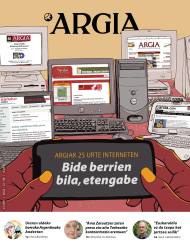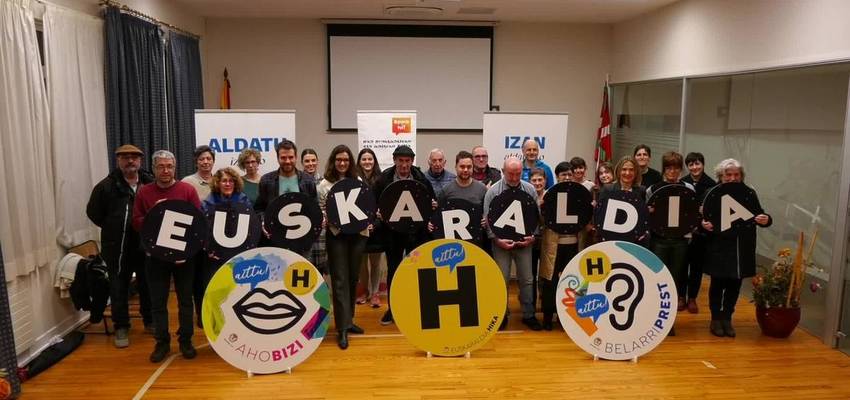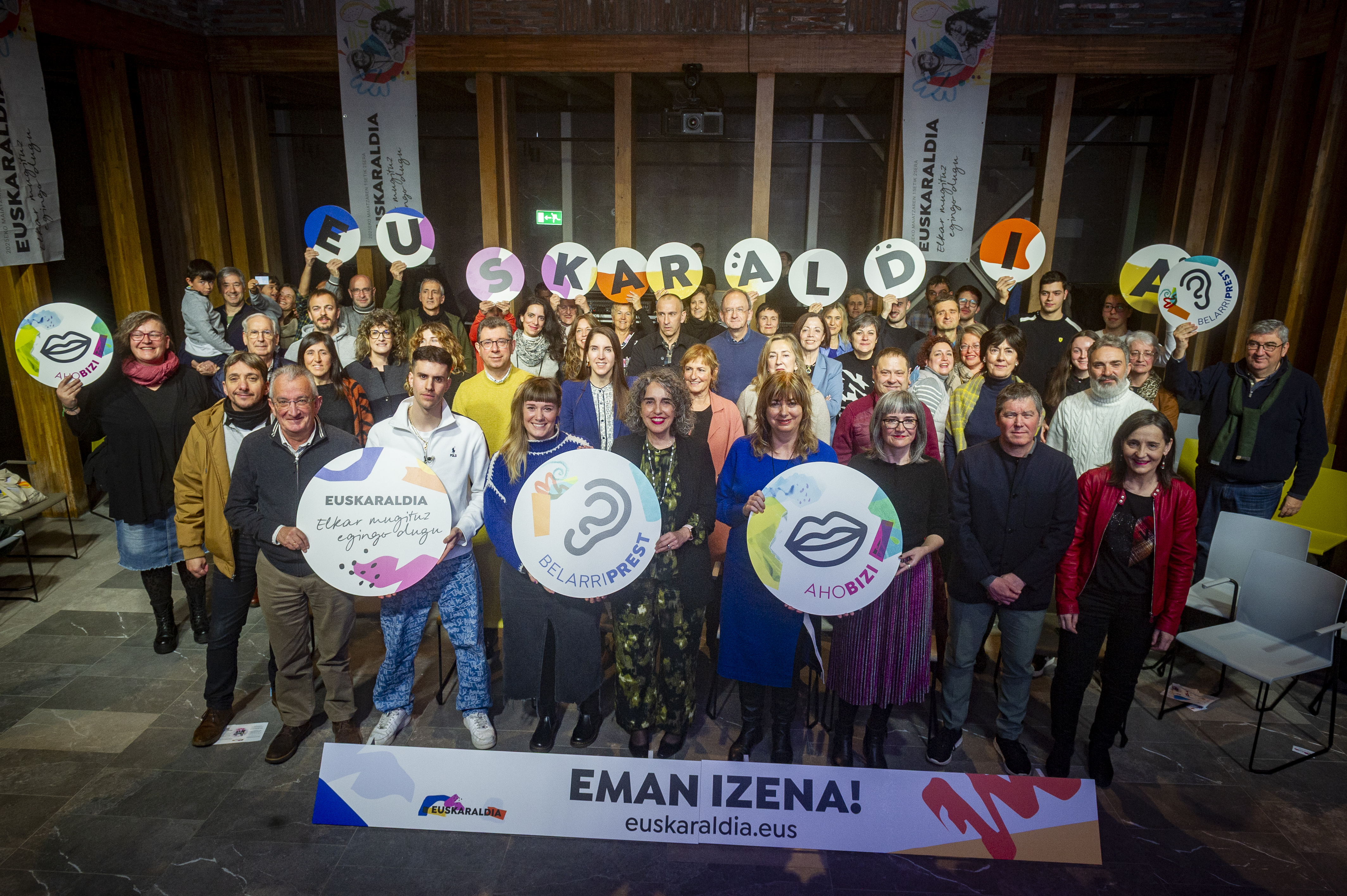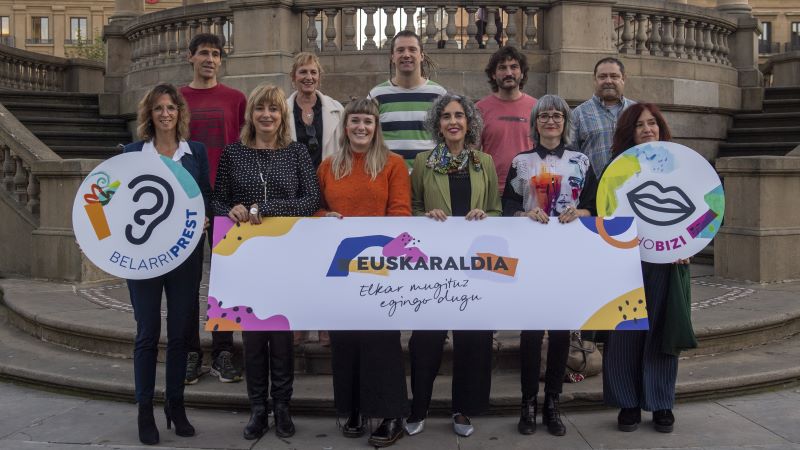“May the empowerment not end with Euskaraldia”
- Taking into account the conferences, press conferences, interviews and meetings, Kike Amonarriz (Tolosa, 1961) answers three or four daily quotes throughout the Basque Country. With the humorist’s mind, the communicator’s clarity, the rigor of the socio-linguist and the responsibility of the Euskaltzaleen Topagunea, he speaks of Euskaraldia, Euskera and the challenges of the Euskaltzales.

The whirlpool of the third edition of Euskaraldia has come. It is time for many months of preparation in this social exercise. How do you live these days?
Very intense and curious. I think this edition will give us many clues. The first edition was the surprise: people didn't really know what it was, but they saw a wave coming up and up the wave. The second was that of the pandemic, in which outbreaks occurred, but many could not be carried out, many establishments closed, people at home or limited…
In the third, people know what Euskaraldia is and have perceived that it is not a position in favor of the Basque, but a practice and a commitment. This year Korrika and Euskaraldia joined the same year, year after the pandemic. The Basque Commissions have been activated after the summer. You'll have to see where they've been activated well, where they've been developed properly, where they're weaker -- the map will be significant. And we'll see what their development is at the level of Arigune and what is their basis for the future. Beyond concrete figures, qualitative reading will prevail. It will remain massive, but we will have to look at the nuances and draw conclusions.
Do you think the dynamics of the areas can be a lever to influence the socioeconomic environment? Can it be a principle for some entities?
Many arigune are part of the Euskaldunization processes that came. The Basque period will help to strengthen and increase them. But in many other places the dynamics of Euskera's use are going to start. In many companies and sports groups it has been raised for the first time: can we create an arigune? The approach to this question has been a great step forward. Is that possible? And if not possible, what steps should we take to meet the requirements in the next edition of Euskara? Without this initial thought, more steps will be taken. Different dynamics will be implemented and when we see that they can be carried out and that they are compatible with daily activity, the door opens to new steps.
Euskera is a meeting point for those who want to take steps to revitalize the language, for those who want to do something for the Basque people in their companies and associations, and a mirror: where are we, what do we do, what can we do?
It is an option that you can take advantage of as all options in different ways. I believe that until now we did not have such tools to raise this possibility so massively in all areas of the Basque Country and in all sectors at once. That is why I believe that Euskaraldia is an artifact of great strength and great possibility.
.jpg)
In previous editions special importance has been given to the role of arranged ears. They have expressed their willingness to broadcast. What role does it play?
The figure Belarriprest socializes the idea that practical attitudes in favor of the Basque Country can be staggered and that each, from its sociolinguistic position, can expand the possibilities of use in its environment. In addition, the figure is very large. They can include those who know Basque well, but because of the conditions of the environment or their situation, not all of us have the same disposition to take steps, they have difficulty using them always. And, on the other hand, it has allowed the Basque people who were far from the Basque world, the Basque students and those able to understand it, to approach the Basque world.
We must bear in mind that more and more people are able to speak in Basque and understand it. At this time, the majority of the population under 30 in Euskal Herria comes from Castilian and Spanish speaking families, lives in Castilian speaking environments, is better developed in Spanish, is integrated in Castilian and Spanish social networks... To this sociolinguistic reality, to this diversified knowledge profile, we offer a diversified and progressive level of behavior. We tell them that you are in the position where you are, that you live in the area where you live, you have the opportunity to collaborate in the use of the Basque.
In addition, what is offered is a way to approach the use of Euskera. In addition, it opens the door to the first word in Basque, opens the door to bilingual conversations, opens the door to the elderly… It is a path of great potential.
“Having a voice is much more than knowing Basque”
You have promoted empowerment schools in some counties, as a pilot test, aimed at the sisters. What is the initiative?
We wanted to deepen the quality of the activity with different initiatives so that people see that Euskaraldia is not simply putting a veneer. Empowerment classes, videos and pedagogical materials, infographics for a better choice of roles, podcast Zapla with Radio Euskadi… These are resources to empower the participants in the activity.
Specifically, in the case of the Schools of Empowerment, it has been attempted to demonstrate that having a voice is much more than the knowledge of the Basque Country and to offer resources to perform this role properly and comfortably. The goal behind this is that empowerment should not end with Euskaraldia. It is important to give continuity to this energy. We want to perpetuate the commissions of Euskera that have been created where there are no associations of Euskera, perpetuate the spaces, establish the new habits of the individuals who have changed their customs… This is not a campaign, it is an exercise that generates results.
One of the novelties introduced in the creation of the Euskararen Aldia was the joint organization of public institutions and social agents. After a few years of work, what is the balance of this cooperation?
Euskaraldia has created a new governance model that has made an important contribution not only to the Basque country. We have managed to ensure that public institutions throughout Euskal Herria collaborate with the Basque cultural activity of all Euskal Herria. The institutions among themselves, the Basque industry among themselves and the institutions with the Basque industry. This was unthinkable a few years ago, not unthinkable, it was impossible. It is essential that the institutions fulfil their role; the participation of society is essential; and, in the case of a minority language such as ours, the accumulation of forces is essential.
This opens a door with all its incidents. It is not easy, nor easy, to agree on such a proposal and move forward. There are many debates, there are different visions, but we have managed to get all parties to have a compromise and at the moment there is confidence to manage discrepancies and problems. This does not mean that there are no discrepancies with the institutions within the Basque culture… But procedures have been put in place to manage them.
Experience may be a showcase for other initiatives by the Basque industry and for other areas of society. In the assessment of the Basque Country Aldia, citizenship has also seen an encounter that has generated illusion.
EITB
He has worked for years at ETB, he also made a proposal in the Basque Parliament's speech. What should be changed so that EITB, as it was originally established, can contribute adequately to the normalization of the Basque country?
We've seen some positive steps in programming: contests, some realities… But there's basically a debate about the organization and the EITB model. Although the parliamentary report did not make progress, a rethinking of EITB is needed to respond to the current and future socio-linguistic situation.
But there's another job. Promote audiovisual consumption in Basque. I am concerned about the low supply, but also about the low consumption there is. If we can be offered by outside companies and see that it's not consumed, we don't have it. There is also a need to change language habits.
We also have youtubers, streamers… There we should also put in place institutional and social strategies to fill the gaps we have. Successful completion is not easy, but it is essential to extend this offer. And strengthen and integrate the media network in Basque citizenship, which can only be achieved through a broad impetus and sociopolitical consensus.
SCREENS IN EUSKERA
They have been organized around the collection of signatures according to the presence of the Basque in the audiovisual media in October. Then came the new laws, the decisions of the platforms, the gestures… Do you see the ways to influence these big players and guarantee a minimum supply?
We all see that the importance of audiovisual media is fundamental in today’s society. For Basques it is a difficult challenge, even for minority languages, but we know that there is also concern in many state languages (Iceland, Sweden…). Responding requires structured collaboration. With regard to the Spanish audiovisual law, we were the agents of the minority languages of the State, but we will have to make the leap to influence at European level.
Firstly, some of the legal advances that can be made will be played in the European framework. Secondly, at the level of companies and multinationals, the interest in us will be limited and we will have to look for loopholes. And the third is what we can create: audiovisual policy, the role of EITB and the audiovisual industry. The media in Basque will also have something to do with it. Today its influence is very limited. Active citizens will also be needed to change this. All these keys must be pressed as coordinated as possible.
Euskaltzaleen Topagunea has just turned 25. What would you say that at the moment are priority challenges for the Topagune and the associative movement of the Basque Country?
On the one hand, we need to define a strategy that responds to the challenges of the next decade. The previous congress was twelve years ago and laid the foundations for what we are today in the Basiparrak and Transformabideak reports. Now, to innovate, we've thought that we need to listen and internalize the voice of the sectors that we want to influence the process of congress. The representatives of these sectors will be integrated into the process following the methodology known as the theory of change. We believe that a leap should be made in the Basque situation. With these sectors we want to analyse what should happen to make the leap. And then the role that the Topagune has to play there.
Secondly, to widen the scope of the Basque associations. The strong social dynamic, social activation, is essential for the situation to progress. We are talking about self-organised citizens. We study the renewal of organizational models. In view of the expansion of the network, last year Topagunea spread, constituted and legalised Iparralde. In Bizkaia we see our weakest situation and strengthening is in the priorities. Another point is to sew a network of active vasophils throughout the Basque Country.
In addition, we have important initiatives in leisure time, in line with diversity, in the forum, activities to extend and perpetuate the effects of the Basque Country…
This year we have seen the results of the street measurement of language use in 2021. In the Basque Country, the use of the street is maintained at the level of the previous measurements, the data is stable. A few years ago he stated in his book, among other things, that the Basque was at the crossroads. Are we still there?
Since 1989, street use has ranged from 10% to 14%, slightly above or below, but always in this interval. There's a lot of data, and we see lights and dark in areas, but in general we find ourselves in an impasse. So, yes, we are at the crossroads.
If we want to turn it around and make a leap in use, we need a collective initiative of another dimension, volume and density. The issue is linguistic policies, social activation and involvement of actors. Oftentimes, Euskera is the subject of sectoral organizations, of a department -- the jump means we're going to need all of them. Like gender policies and climate change policies, Euskera’s policy must permeate all institutions and sectors.
We must understand systemically why use has been maintained for 32 years. Since the objective is to affect the entire system, we must start from a common diagnosis. And then the time has come to think about systemic change. The institutions responsible for linguistic policy, the actors involved in the dynamic Batuz Aldatu of the Council, Euskaltzaindia and Topagunea are imposing the idea of the need for a shared approach.
.jpg)
Euskaraldiaren hamaikakoa aurkeztu dute Nafarroan: Julio Soto bertsolaria, Edurne Pena aktorea, Julen Goldarazena musikaria (Flakofonki), Claudia Rodriguez Goxuan Saltsan taldeko abeslaria, Eneko Garcia (Albina Stardust), Yasmine Khris Maansri itzultzaile eta kazetaria,... [+]
Gasteizen egin duten ekitaldian ireki dute izen ematea, laugarren edizioa hasteko bi hilabete falta direla. Erakundeetako ordezkariak, herritarrak eta entitateetako kideak agertu dira, besteak beste. Euskaraldiaren koordinazioa Euskal Herriko erakunde publikoen eta Taupa... [+]
Hamahiru ZirHika kide batu dira hitanoaren erabilera aldarrikatzeko eta antolakundearen ekintzen berri emateko. Azalpenak Badihardugu elkarteko Idoia Etxeberria eta Galtzaundiko Uxoa Elustondok egin dituzte. Horiei, Andoni Egaña eta Amaia Agirre bertsolariak eta... [+]
Euskaraldia comes back. Apparently, it will be in the spring of next year. They have already presented it and the truth is that it has surprised me; not Euskaraldia himself, but his motto: We'll do it by moving around.
The first time I have read or heard it, the title of the... [+]
The Basque country is about to finish writing these lines, the end is still insufficient. They will certainly be beautiful, similar to those of a great party.
In Bizkitarte I have carefully read, here or in other publications, lines written by people more expert than I, let us... [+]
On November 18, the “Euskaraldia” began, an initiative that aims to promote the use of Euskera among Basque speakers and non-Basque speakers for two weeks. Although I believe that this initiative has shortcomings in some contexts and there is no better veneer than “Good... [+]




















